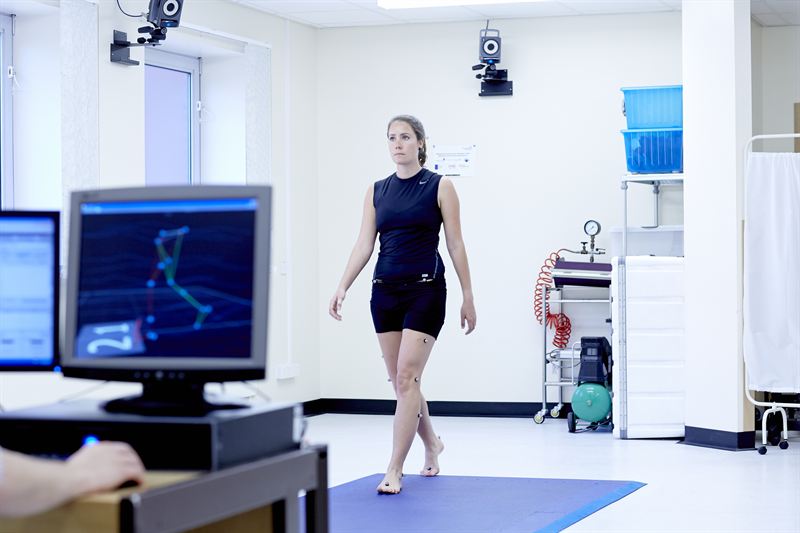Motion capture set to become more mainstream in medical science predicts Vicon

Improved accessibility, smarter cameras and a focus on preventative healthcare to drive adoption in 2015
Oxford, UK - 11 February 2015 – Vicon, the motion capture technology specialist for the life science, entertainment and engineering industries, is predicting changing working practices and technology innovation will drive the adoption of motion capture technology in the medical science sector. Derek Potter, Vicon’s head of product management, believes that the next few years will see major changes in the accessibility of motion capture systems. Key predictions of the company are:
1) Lower cost technology to drive use in preventative healthcare – As motion capture systems become more economical they will become far more widespread, with the potential to bring huge benefits in areas such as preventative healthcare. With the production of more affordable systems, local clinics and GP surgeries could begin to use mocap technology to provide patients with assessments, which are able to predict the likelihood of an injury worsening over time.
2) Increased data encourages a productive community – As more motion capture systems operate in local clinics and surgeries there will be far more data captured. By sharing the data for the mutual benefit of other practices, users will be able to compare results from a vast database in areas such as gait analysis for medical rehabilitation. This will increase collaborative decision making to allow practitioners to make better informed medical decisions. A community of medical professions who are empowered to more easily share data will be able to work together to drive medical innovation.
3) Smarter system to enhance mocap accessibility - Ten years ago, it would have taken at least a week or two to train somebody to set up and use a system. Now, as motion capture systems grow more compact, smarter and simpler to use they can be up and running in a day or two with the need for less physical space. As systems become more advanced they will be able to calibrate themselves, detect when a subject is in view and begin to capture automatically.
Potter comments: “We’re seeing motion capture systems adapt and evolve to become more accessible. The proliferation of the technology will give medical decision-makers access to far more data than previously possible and this can only help improve the quality of patient care. From your local doctor to established institutions, expect to see mocap playing an ever more significant role in pushing the boundaries of medical sciences.”
Motion capture technology from Vicon is on the frontline of cutting-edge clinical movement research - from helping to rehabilitate wounded soldiers to understanding the ways animals move and interact to improving the form of world-class athletes. It is critical to the work of leading research centres, universities, hospitals and private medical practices around the world.
About Vicon
Academy Award®-winning Vicon is the world’s largest supplier of precision motion tracking systems and match-moving software. It serves customers in CG animation, engineering and life sciences industries. As well as those in film, visual effects, computer games and broadcast television sectors.
Vicon is a subsidiary of OMG (Oxford Metrics Group - LSE: OMG), plc., a group of technology companies that produces image understanding solutions for the entertainment, defense, life sciences and engineering markets. Other holdings include: 2d3, a manufacturer of specialized image understanding software for defense applications; OMG Life, our IP licensing business; and Yotta, a provider of software and services for infrastructure asset management.
Among many others, Vicon global clients include:
Entertainment: Audiomotion, The Imaginarium, Quantic Dream, SEGA, Konami, Activision, Sony, Dreamworks, ILM and USC Engineering: European Space Agency, BMW, Council for Scientific and Industrial Research – South Africa, ETH Zurich, Korea Institute of Ocean Science and Technology, NRL, UPENN GRASP, MIT, Ford and General Motors Life Sciences: Nuffield Orthopaedic Centre - Oxford, Headley Court, University of Western Australia, Adidas, Digital Human Research Centre - Japan, Gillette Children’s Specialty Healthcare, Shriners, Marquette, UMich and Red Bull
For more information about OMG and its subsidiaries, visit: www.omgplc.com, www.vicon.com, www.vicon.com/boujou, www.2d3sensing.com or www.yotta.co.uk.
Contact details
Red Lorry Yellow Lorry
Joanna Clark
020 7403 8878
Joannac@rlyl.com
Tags:



